Wondering if rosemary oil for hair growth really works? You're not alone.
This natural remedy is gaining attention for promoting thicker, healthier hair.
In this article, we’ll explore the science behind rosemary oil, share before and after results, and see if it’s the solution your hair needs.
Table of content
How does rosemary oil work for hair loss?
Rosemary oil helps combat hair loss by naturally blocking the production of DHT, a hormone linked to male pattern baldness.
It works similarly to topical Finasteride by inhibiting the enzyme 5 alpha-reductase, which converts testosterone into DHT.
By reducing DHT levels on the scalp, rosemary oil can slow down hair thinning and even encourage regrowth.
However, because DHT is necessary for healthy beard growth, rosemary oil isn't effective for enhancing facial hair.
This natural remedy is a gentle yet effective option for those looking to manage hair loss without harsh chemicals.
As your leading source for hair health information over the past 4 years, we never compromise on accuracy. When it comes to your health, you deserve information you can truly rely on - and earning your trust is our top priority.
Here's how Scandinavian Biolabs ensures every piece of content meets the highest standards of accuracy and integrity:
- Credentialed Experts: Our reviewers are actively practicing doctors and medical researchers
- Stringent Reviews: Content undergoes rigorous editing by subject specialists and review by a practicing doctor.
- Evidence-Based: We rely on well-established research from trusted scientific sources like peer-reviewed journals and health authorities.
- Full Transparency: Our editorial standards, writer credentials, reviewer credentials, correction process, and funding are all publicly documented.
- Independent Voice: While we do promote products, we operate in a vacuum to business operations. Our main goal is just an unwavering commitment to providing medically-sound guidance.
You can count on Scandinavian Biolabs to consistently deliver the trustworthy health information you deserve. Read our Editorial Standards.
Rosemary oil for hair growth before and after
Results from rosemary oil for hair growth can vary; some may see significant improvements quickly, while others might need up to six months. Consistency and individual factors play a crucial role in the effectiveness.
Rosemary oil before and after results for women
Found on Reddit, these are before and after results from women. While these results are impressive, it's important to remember that hair loss is an issue caused by multiple factors. While rosemary oil can help, it could also result from the persons' heightened awareness of hair loss which can influence their life changes (reduced stress, more sleep, less/no smoking).
Rosemary oil before and after results for men
For these, we visited YouTube, where a lot of channels are speaking on rosemary oil and its effects. It's important to watch and consider closely affliations when it comes to these before and after. For the sake of this article, we try our best to not include any content that seemed sponsored or trying to sell you something.
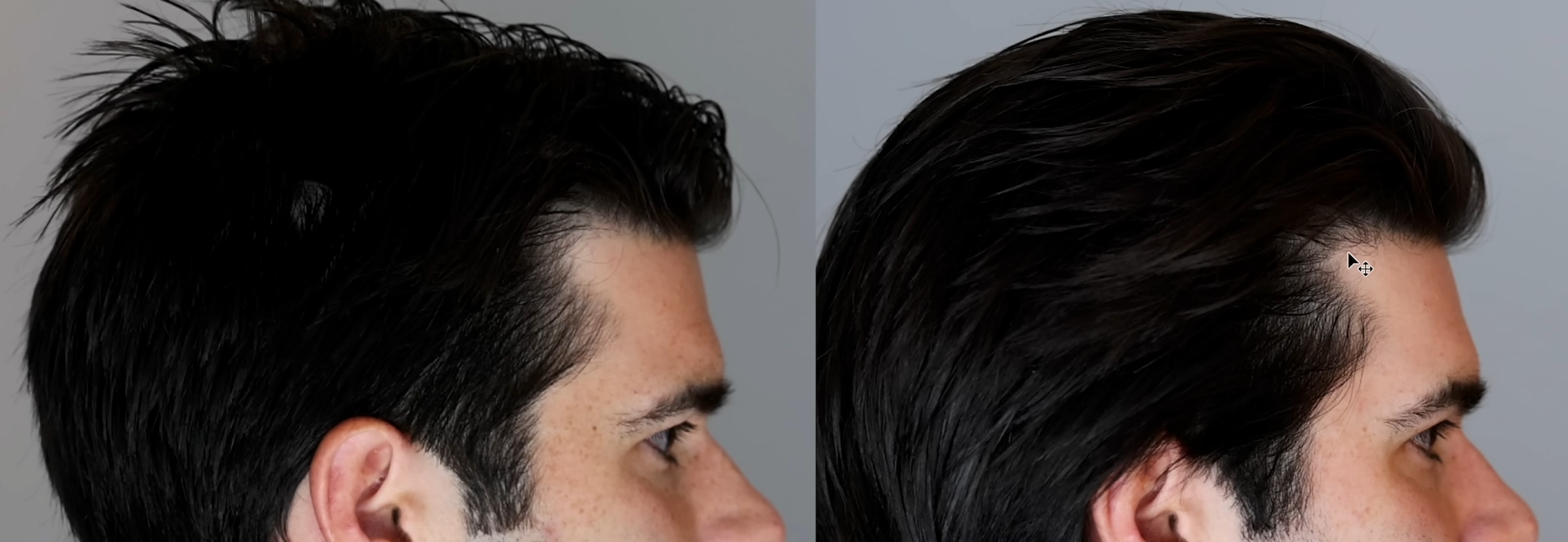
The picture above is a before and after of YouTuber pigmie, who tested rosemary oil along with a lotion (instead of a carrier oil) for 120 days.
This result below is from YouTuber and blogger Nick Shell, who claimed his test is purely informational and not trying to sell you anything. He tested rosemary oil concoction for 6 months.
Before:

After:

This last before and after is from Reddit.
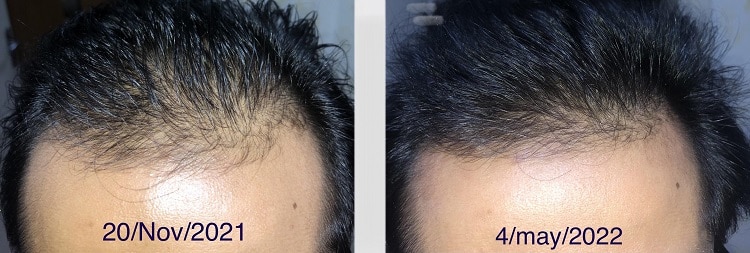
Rosemary oil for hair growth clinical before and after results
As of March 2024, to our knowledge, there's only one clinical, controlled-study of rosemary oil with visual before and after results.
The patient in the picture applied 1ml of rosemary oil to his hair twice a day, everyday for 6 months.
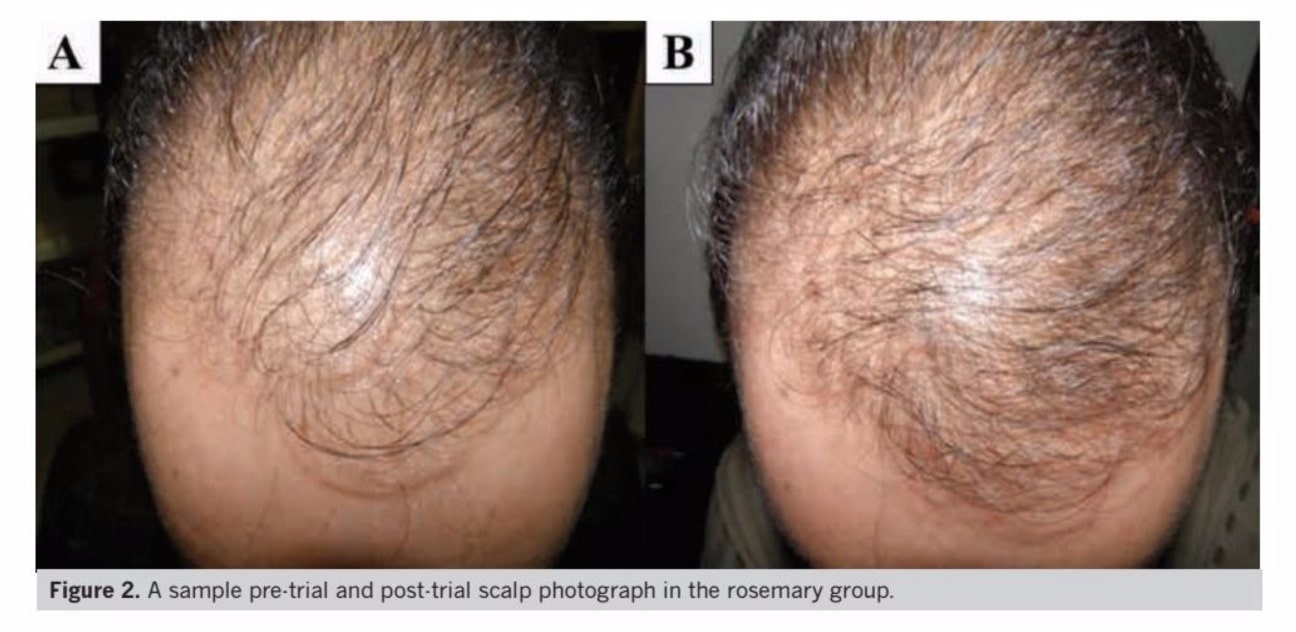
If your reaction after seeing all of these before and after is: "Well, that's not much of difference!" then we concur.
What are the active ingredients in rosemary oil?
Rosemary oil is packed with powerful active ingredients that promote hair health and growth. Here are the key components and their benefits:
- Glycolic acid: Protects hair and makes it softer.
- Flavonoids: Stimulate hair growth.
- Tannins: Support color-treated hair.
- Saponins: Provide anti-inflammatory properties.
- Bitter substances: Offer antioxidant and antimicrobial benefits.
Additionally, rosemary oil may contain other essential oils like camphor, carnosol, cineol, terpineol, or borneol, enhancing its effectiveness in boosting blood circulation and reducing inflammation.
How long does rosemary oil take to show results?
Rosemary oil typically takes 2 to 3 months of consistent use to show visible hair growth results. This time allows the oil's nourishing and stimulating properties to enhance blood circulation and deliver essential nutrients to the hair follicles.
Regular application is crucial, as the cumulative effects contribute to healthier hair and reduced hair loss.
However, hair growth is a gradual process, influenced by factors like genetics, diet, and overall health, so patience and consistency are key when using natural remedies like rosemary oil.
Alongside its use, maintaining a healthy lifestyle and proper hair care routine can further support and accelerate growth.
Should you use rosemary oil for hair growth?
Yes, rosemary essential oil can stimulate dormant follicles and promote new hair growth. A 2015 study found it rivaled 2% minoxidil for androgenetic alopecia treatment with less skin irritation. Rosemary's antioxidants and blood flow-boosting effects signal how it nourishes follicles.
While more research is needed, existing evidence supports rosemary oil as a potential natural hair growth aid worth considering.
Remember to consult with a board certified dermatologist for an accurate assessment of whether rosemary oil is compatible with your hair type or if you have sensitive skin.
To use rosemary essential oil for hair loss, here are 4 easy ways:
- Make a rosemary hair oil concoction: While rosemary is beneficial on its own, using a carrier oil like jojoba oil, olive oil, almond oil, coconut oil, or castor oil can help with absorption and moisturization.
- Make your hair loss essential oils formula: Combine pure rosemary oil with other essential oils that are helpful for hair growth such as peppermint oil, pumpkin seed oil, and a carrier oil.
- Use rosemary water instead: You can buy fresh rosemary from the store and boil it in water to extract nutrients from the rosemary plant.
- Buy rosemary oil products: Mielle Organics or Kiehl's Magic Elixir Scalp & Hair Oil Treatment.
How often should you use rosemary oil on your hair?
Experts recommend using it on your scalp 2-3 times per week. Massage 1-2 drops directly onto the scalp and leave it for 30 minutes before shampooing allowing for absorption of the antioxidants and nutrients to nourish follicles at the root. This frequency of 2-3 sessions spaced throughout the week is sufficient to experience results like reduced shedding and increased thickness over time.
Stop if you experience any irritation.
Alternatives to rosemary oil for hair growth
Here are the 7 best alternatives to rosemary essential oil that helps reduce thinning hair and promote hair growth.
Bio-Pilixin Activation Serum
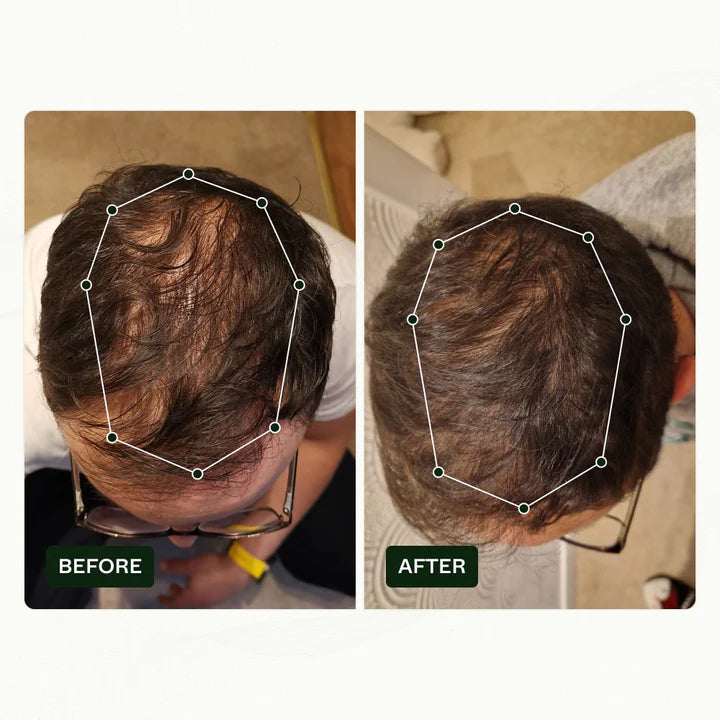
Are you losing the battle against hair loss? Frustrated by ineffective remedies and piecemeal solutions that leave you still seeing hair in the sink?
It's time to take your hair growth journey to the next level with a comprehensive, research-backed formula that tackles hair loss at its roots.
While natural oils like rosemary have shown promise, Bio-Pilixin Activation Serum is the result of rigorous scientific study.
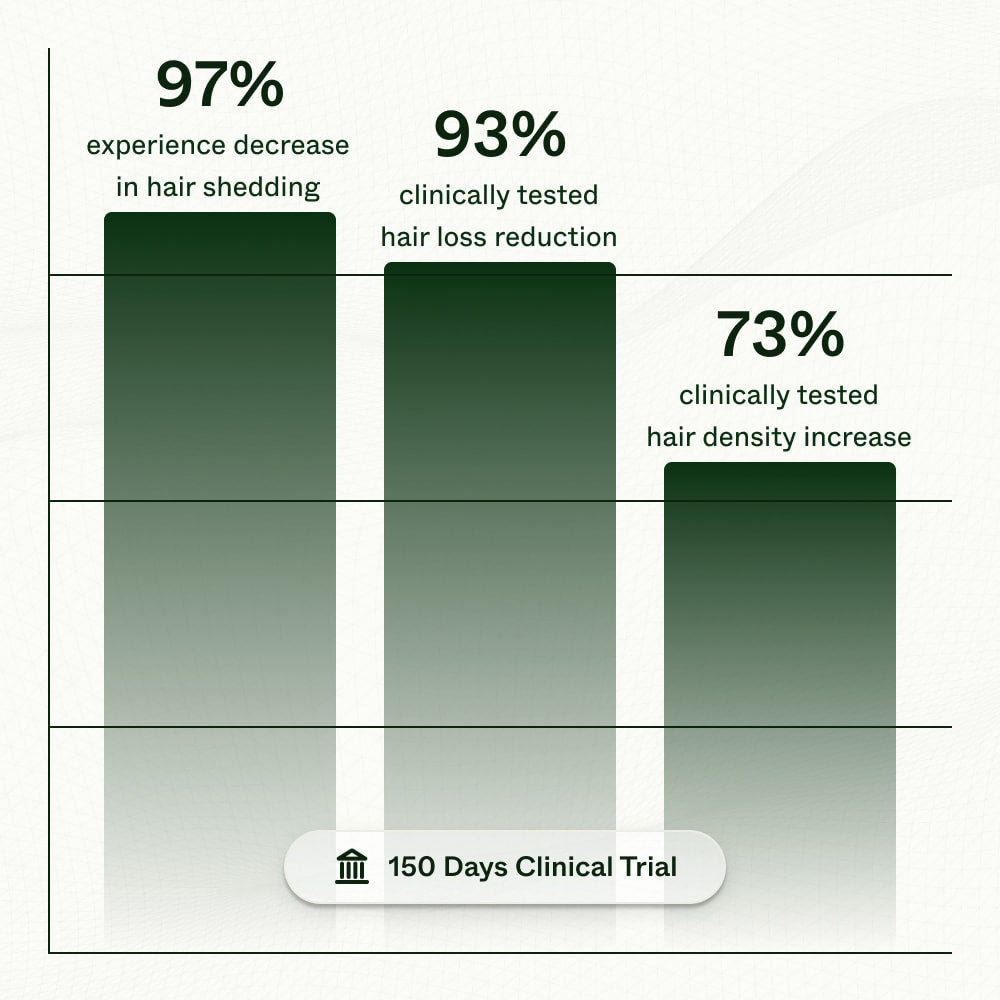
Our research and clinical testing uncovered the unaddressed causes of shedding and thinning hair.
Then we engineered a targeted hair wellness complex to nourish follicles, soothe scalps, and stimulate growth from within.
Unlike temporary fixes, Bio-Pilixin provides lasting results through its multifaceted approach. Say goodbye to washouts and empty promises with our holistic formula proven to restore fuller, healthier locks.
Experience the confidence that comes with thicker, stronger growth - guaranteed or your money back.
Finasteride
Finasteride is a prescription-only DHT blocker effective in treating male pattern baldness by inhibiting the hormone responsible for hair loss. It's essential to consult a healthcare provider to determine if Finasteride is right for you.
Minoxidil
Minoxidil is a well-known topical treatment for various types of hair loss, including pattern baldness and thinning. Available over the counter, it stimulates hair follicles to promote the hair growth cycle again.
Caffeine shampoo
Caffeine shampoo, such as Alpecin, utilizes caffeine's properties to invigorate the scalp and promote healthy hair growth by targeting hormonal factors and improving the blood supply and circulation to hair follicles.
Low-level laser therapy
This non-invasive treatment uses lasers directed at and not the hair strand scalp to encourage cellular activity and hair regrowth, offering a high-tech solution for those seeking alternatives to topical treatments.
PRP (Platelet-Rich Plasma) therapy
PRP therapy involves injecting platelet-rich plasma derived from your blood into the scalp to stimulate hair growth by promoting the repair of tissues and supporting hair follicle health.
Hair transplant
For those looking for a more permanent hair loss solution, hair transplants involve moving hair from one part of the body to the scalp, providing lasting results for hair restoration. This is the most expensive option.
Conclusion
In conclusion, enlisting rosemary oil help in fighting your androgenic alopecia or alopecia areata is a promising start.
Remember the basics: use a carrier oil, combine it with other essential oils, and stop if you experience itchy scalp or any scalp irritation.
But, for those who seek a guaranteed solution, Bio-Pilixin Activation Serum presents a more complete approach to help improve hair health, reduce hair loss, and stimulate hair growth from your hair roots.
References
- Dihydrotestosterone [Internet]. [cited 2021 Sep 19]. Available from: https://www.yourhormones.info/hormones/dihydrotestosterone/
- Burke D. Allergic Reaction: Symptoms, Treatment, Prevention & More [Internet]. 2021 [cited 2021 Sep 19]. Available from: https://www.healthline.com/health/allergies/allergic-reaction
- Green B. How Bad are Parabens for Your Hair? [Internet]. 2018 [cited 2021 Sep 19]. Available from: https://voiceofhair.com/how-bad-are-parabens-for-your-hair/







